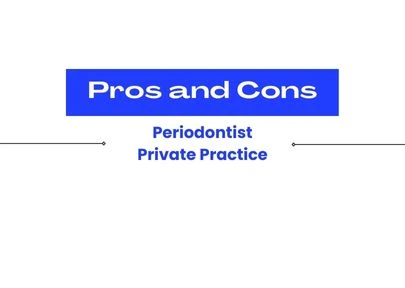Choosing Between Private Practice and DSO: What’s the Ideal Career Path for Periodontists?
DSO vs private practice periodontist is a debate in which dental professionals often find themselves having, particularly new graduates entering the realm of periodontics. Deciding on a career path is important, not only for professional development but also for job satisfaction in the long run.As a periodontist, you’ll need to decide between joining a dental service organization (DSO) or managing your private practice. Both options offer unique benefits and challenges, and your decision should align with your personal goals, lifestyle, and professional expectations.
In this blog, we’ll take a close look at the periodontist private practice pros and cons, the realities of working in a DSO as a periodontist, and what it means to build a career in each setting. We will assist you in knowing how dental service organization careers for specialists differ from the autonomy and accountability of having a clinic.
Understand the Pros and Cons of Periodontist Private Practice

Having a private practice provides freedom and control of patient care. When evaluating the DSO vs private practice periodontist career path, many professionals ( aspiring dentists) are drawn to private practice for the independence it offers.
Pros of Periodontist Private Practice
Private practice may be personally and financially rewarding for those willing to take on the workload. The following are some key periodontist private practice advantages and disadvantages to keep in mind:
Independence: You have complete decision-making authority, from treatment methodologies to administrative regulations.
Financial Potential: In the long run, private practice is potentially more profitable than a salary job.
Relationships with Patients: Establishing long-term rapport with patients is simpler in a solo or small group practice.
Work Flexibility: You can mould your work environment and schedule to fit your lifestyle.
Salary: The salary of a periodontist in a private practice can vary widely. On average, a periodontist earns around $257,176 per year. However, private practice owners can earn significantly more, with some periodontists making over $400,000 annually.
Cons of Periodontist Private Practice
While rewarding, private practice also comes with its own set of difficulties and risks. To fairly assess DSO vs private practice periodontist, let’s look at the disadvantages of going solo:
High Startup Costs: You’ll need capital to buy equipment, rent space, and hire staff.
Business Pressure: Handling HR, marketing, billing, and compliance can be overwhelming.
Work-Life Balance: Long hours are common, especially at the beginning of a career.
Financial Risk: Your income can vary depending on how many patients you consult.
What is a Dental Service Organization (DSO) and Why Consider Working in a DSO as a Periodontist?
A Dental Service Organization, or DSO, is a business entity that supports dental offices by managing nonclinical duties. These duties can include marketing, employee hiring, billing, scheduling, and administrative paperwork. By handling the business side, DSOs allow dentists, including specialists like periodontists, to focus more on patient care.
In recent years, DSOs have expanded rapidly across the United States, offering a wide range of dental service organization jobs for specialists such as periodontists, orthodontists, and oral surgeons. For new graduates or professionals looking for structured support, working in a DSO as a periodontist can provide consistent patient flow, mentorship, and a strong administrative backbone to grow your clinical career with confidence.
Pros of Working in a DSO as a Periodontist
DSOs provide a less stressful transition into professional work, particularly for youthful or freshly graduated dentists.
No Business Burden: Just practice patient care without concern for running a practice.
Steady Income: You have a steady salary, at times with bonuses tied to performance.
Career Support: DSOs usually give continuing education, mentorship, and technical support.
Team Environment: You’ll often work alongside a team of professionals in a well-equipped setting.
Must Read: Difference Between DSO and Private Practice
Cons of Working in a DSO as a Periodontist
Despite the ease and organization, DSOs do have limitations that may not appeal to every specialist’s long-term vision.
Limited Autonomy: Treatment plans and schedules can be dictated by company policy.
Patient Volume Pressure: Certain DSOs prioritize speed over quality, which can be stressful.
Lower Long-Term Earnings: Stable, though DSO pay may not equate to private practice financial potential.
Less Personal Patient Connection: With busy settings, long-term relationship development can be more difficult.
Ultimately, the decision between a DSO vs private practice periodontist career depends on your aspirations and inclinations. If stability, support, and doing strictly clinical work are important to you, being a periodontist in a DSO could be an excellent beginning. However, if autonomy, financial development, and establishing long-term patient relationships are more desirable to you, private practice could be the superior long-term option.
By knowing the periodontist private practice advantages and disadvantages and what dental service organization careers for specialists provide, you can make an informed decision that suits your career aspirations.
Best Career Path for Periodontists: DSO vs Private Practice – Which One Is Right for You?

When considering the best career path for periodontists, one common debate is the choice between DSO vs private practice periodontist careers. If you’re someone who values stability, support, and a predictable work schedule, working in a DSO as a periodontist might be a better choice. It offers a steady income and reduces the stress associated with managing a business.
On the other hand, if you’re entrepreneurial, enjoy having control over your work environment, and are willing to take on the challenges of managing a practice, private practice might be a more fulfilling option. While it requires more work upfront, it can also offer greater financial rewards and professional independence in the long run.
Ultimately, the best career path for periodontists depends on individual priorities. Knowing the pros and cons of DSO vs private practice periodontist roles will help you make an informed decision. Whether you opt for the structured guidance of a DSO or the autonomy of private practice, choose the setting that aligns best with your skills, lifestyle, and long-term vision.
Final Verdict- Finding the Right Fit for Your Periodontist Career
In the discussion between DSO vs private practice periodontist, there’s not a right or wrong path, but what suits you best personally and professionally. Either path is rewarding for periodontists.
What’s important is: Your goal is, are you after autonomy and authority, or would you like structure and security? However you go, working in a DSO or becoming your boss, your key to success will be recognizing what you’re seeking from your professional life.
Ready to choose your career? Evaluate your goals, research your options, and speak with mentors in private practice and DSOs. You’re new to the practice or want to change careers? Now is the moment to act to create the practice you dream of as a periodontist. For expert guidance, connect with a trusted dental service organization recruiter to explore the best opportunities and take the next step confidently.
FAQs – About DSO vs. Private Practice for Periodontists
Q1. What is the primary distinction between private practice and DSO for periodontists?
The primary distinction is control and support. Private practice provides complete control but demands business management. DSOs manage operations so dentists can concentrate on care.
Q2. Is it good for new graduates to work in a DSO as a periodontist?
Yes, working in a DSO as a periodontist provides a stable income, guidance, and less responsibility outside the clinical aspect, perfect for new graduates.
Q3. What are the economic advantages of private practice?
In the long term, private practice can provide better pay, particularly once a patient base is developed, but it comes with a higher upfront investment.
Q4. Are there opportunities for professional development in DSOs?
Absolutely. A large number of dental service organization jobs for specialists have clear advancement paths, leadership roles, and continuing education opportunities.
Q5. Can I transition from a DSO to private practice later?
Yes. A lot of dentists begin in a DSO, gain experience, save money, and then open their practice when they feel established.
Q6. What are the disadvantages of private practice?
Private practice offers great autonomy, but it comes with the stress of running a business, recruiting staff, and marketing your services. While it has the potential for higher income, some periodontists in private practice earn over $400,000 annually, it also involves financial risk, especially in the early stages.
Q7. Do DSOs offer flexible working hours?
Some, but most, have set hours and performance goals. Flexibility is dependent on the organization and what your role within it is.
Q8. What is the most suitable career progression for periodontists seeking work-life balance?
If work-life balance is your top concern, a DSO may prove to be the optimal career choice for periodontists, which has fewer stresses and more pre-arranged hours.
Related Article: Difference Between DSO and Private Practice





